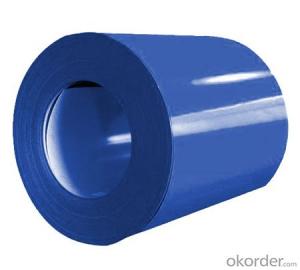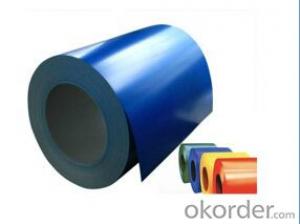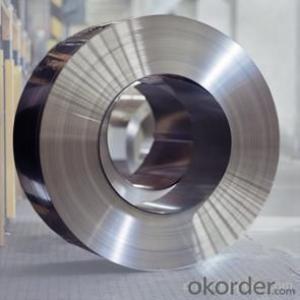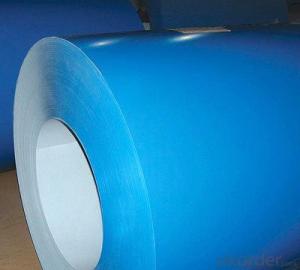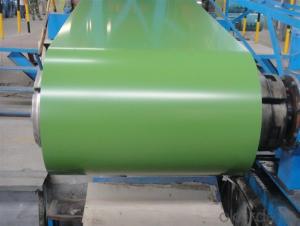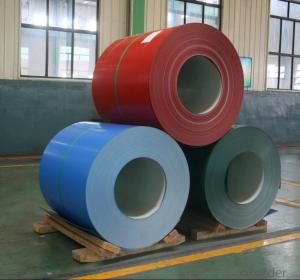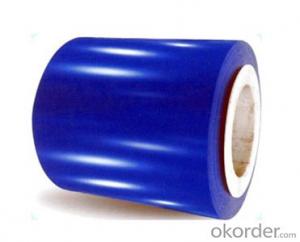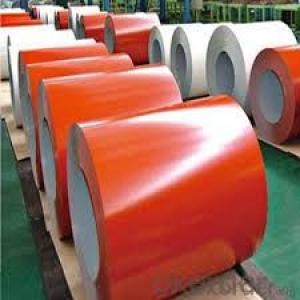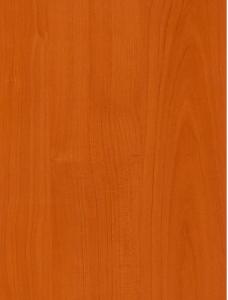Prepainted Galvanized Steel Coil-EN 10169 S320GD+Z with Best Quality
- Loading Port:
- China main port
- Payment Terms:
- TT OR LC
- Min Order Qty:
- 25 m.t.
- Supply Capability:
- 15000 m.t./month
OKorder Service Pledge
OKorder Financial Service
You Might Also Like
Prepainted Galvanized Steel Coil-EN 10169 S320GD+Z with Best Quality
Description of Prepainted Galvanized Steel Coil-EN 10169 S320GD+Z
Prepainted Galvanized Steel usually refers to have substrate processed with surface processed and coated then(roller coated )or bonded organic thin film and baked, and it is able to be processed to final prodevtion .
Prepainted Galvanized Steel qualified with excellent decorative ,formability ,corrosion resistance ,coating adhesion ,can keep for a long time as well as maintain fresh color .For color coated steel sheet can obtain good economic benefit by steel belt wood ,efficient in construction and save energy ,prevent pollution etc.Which is an ideal material;for manufacturing board.
Specification:
Thickness: 0.2-0.8mm
Width: 600-1250mm
Length: on request
Zinc coating: 30-275g/m2
Color: RAL series
Paint: PE, PVDF, PU
Images
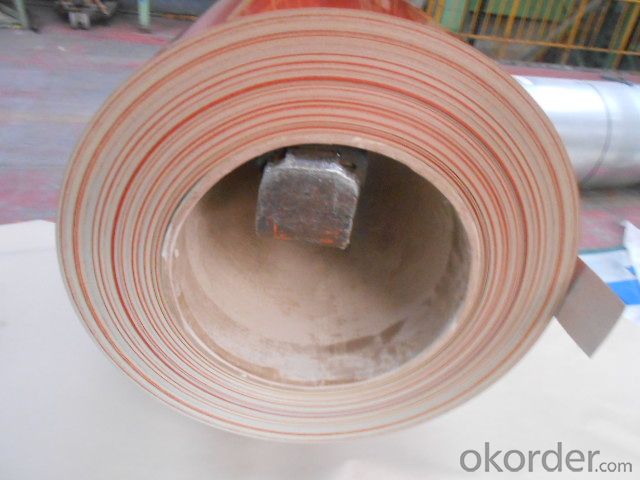
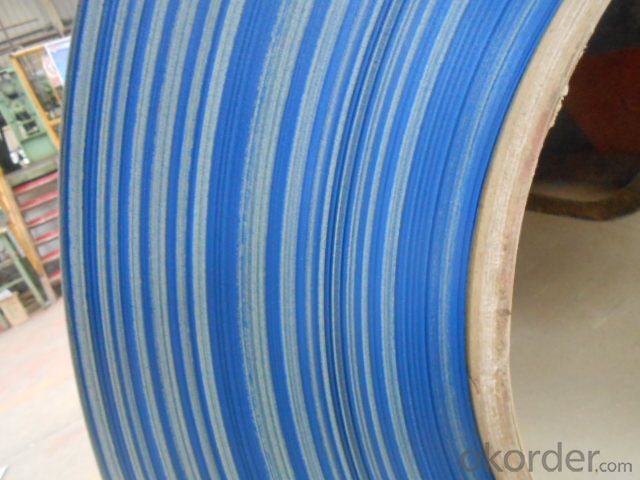
Application:
1.Buildings and constructions: roofing, ceilings, gutters, venting lines, indoor decorations,window frames, etc
2.Electrical appliances: computer shells, washing machines, refrigerators, dehumidifiers,video recorders, water heaters, etc.
3. Agricultural equipments: troughs, feeding tools, agricultural driers, irrigation channels, etc.
4. Vehicle parts: back-seat plates of buses and trucks, conveying systems, oil tanks, etc.
Main Features :
1. High strength
2. Well rainproof performance
3. Good corrosion
4. Easy to install and remove
5. FAQ
1.How to guarantee the quality of the products?
We have established the international advanced quality management system,every link from raw material to final product we have strict quality test;We resolutely put an end to unqualified products flowing into the market. At the same time, we will provide necessary follow-up service assurance.
2. How long can we receive the product after purchase?
Usually within thirty working days after receiving buyer’s advance payment or LC. We will arrange the factory manufacturing as soon as possible. The cargo readiness usually takes 15-25 days, but the shipment will depend on the vessel situation.
- Q: What are the dimensions of steel coils used in the metal furniture industry?
- The dimensions of steel coils used in the metal furniture industry can vary depending on the specific requirements of each manufacturer. However, commonly used dimensions include coil widths ranging from 24 to 60 inches (61 to 152 cm) and coil diameters ranging from 36 to 72 inches (91 to 183 cm). The thickness of the steel coils can also vary, typically ranging from 0.020 to 0.250 inches (0.05 to 0.64 cm). These dimensions allow manufacturers to efficiently produce various types of metal furniture, such as chairs, tables, and cabinets, by utilizing the steel coils as raw materials for their production processes.
- Q: What are the different types of steel coil packaging?
- Various industries use different methods to package steel coils. Some common types include: 1. Wooden Crates: Steel coils are often placed in wooden crates for transportation and storage. These crates effectively protect against damage and ensure secure transit. 2. Steel Frame Bundles: Steel coils are tightly strapped together using steel bands or wires, creating a sturdy bundle that can be easily lifted and moved with cranes or forklifts. This method is suitable for vertical stacking. 3. Steel Strapping: Steel coils can also be packaged using steel strapping. Straps are tightly wrapped around the coils to secure them in place, providing protection against movement and damage during transportation. 4. VCI (Volatile Corrosion Inhibitor) Packaging: VCI packaging is ideal for preventing corrosion during storage and shipment. The coils are wrapped in special VCI film or paper that releases corrosion-inhibiting molecules, ensuring the coils remain rust-free. 5. Cardboard Packaging: Smaller steel coils or those needing extra protection can be packaged in cardboard boxes or cartons. The coils are placed inside and the box is sealed, creating a barrier against damage and contamination. 6. Stretch Wrapping: Plastic film is tightly wrapped around the steel coils, creating a secure and protective layer. This method is useful when coils need protection from dust, moisture, or other external elements. The choice of steel coil packaging method depends on factors such as size, weight, transportation requirements, and desired level of protection. Each method offers its own advantages and is chosen based on industry needs and coil specifications.
- Q: How do steel coils contribute to the manufacturing of construction materials?
- Steel coils contribute to the manufacturing of construction materials by providing a reliable and versatile raw material. These coils are typically made from high-quality steel and can be easily shaped, cut, and formed into various components such as beams, pipes, and sheets. The strength and durability of steel make it ideal for use in construction, ensuring the integrity and longevity of buildings and structures. Additionally, the consistent quality and availability of steel coils enable efficient and cost-effective production processes, making them an essential element in the manufacturing of construction materials.
- Q: What are the different types of surface treatments for steel coils?
- Steel coils can undergo various surface treatments to enhance their appearance, protect against corrosion, and improve durability. Common treatments include: 1. Hot-dip galvanizing: Immersing steel coils in molten zinc creates a protective layer, offering exceptional corrosion resistance and resilience in harsh environments. 2. Electro-galvanizing: Electroplating a thin zinc layer onto the steel surface provides good corrosion resistance and enhances aesthetics. 3. Organic coating: Coating steel coils with organic materials like paints, lacquers, or polymer films offers corrosion, abrasion, and UV protection, while providing a wide range of color options. 4. Phosphating: Treating the steel surface with a chemical process forms a layer of phosphate crystals, improving coating adhesion and corrosion resistance. 5. Chromating: Also called passivation, this treatment involves applying a chromate conversion coating, enhancing corrosion resistance and offering a decorative finish. 6. Oiling: Applying a thin layer of oil to steel coils during storage and transportation prevents corrosion and can be easily removed before further processing. 7. Pickling: Immersing steel coils in an acid solution removes impurities and scale, improving surface finish and preparing the steel for subsequent processing or coatings. 8. Tin plating: Electroplating a layer of tin onto steel coils provides excellent corrosion resistance, solderability, and aesthetic appeal. These treatments are just a few examples of the many available for steel coils. The choice depends on specific application requirements, including desired appearance, corrosion resistance, and environmental conditions.
- Q: it isn't a SIGG water bottle or any other brand, as it's from thingsengraved what I'm wondering is, is this just as good as a SIGG water bottle, or is there any difference?
- The problem with stainless steel water bottles is the steel takes even longer to decompose in our landfills then plastic its self. So it just adds to the waste. If you use steel be sure to recycle it when you are done using it. Another problem is the fact that we don't really make steel here anymore so you have to pollute the environment shipping steel here that the bottles are made from. It gets ship here on trucks, ships, and what not. Very big polluters!! You'd be better off just getting a reuseable bpa free plastic water bottle made in the usa. Or some of those expensive corn cups.
- Q: what are the properties that can strengthen the steel to withstand earhquake?
- Some buildings are built on giant springs so they wobble when there's an earthquake but don't try to ride it out.
- Q: Can steel coils be coated with weather-resistant materials?
- Yes, steel coils can be coated with weather-resistant materials such as zinc, aluminum, or organic coatings to enhance their resistance to corrosion and exposure to harsh weather conditions.
- Q: How are steel coils inspected for thickness using ultrasonic testing?
- Steel coils are inspected for thickness using ultrasonic testing by first preparing the surface of the coil and applying a couplant gel. Then, an ultrasonic transducer is placed on the surface and emits high-frequency sound waves into the coil. These sound waves travel through the material and are reflected back when encountering a change in thickness. The transducer receives these echoes and measures the time it takes for them to return. By analyzing the time delay, the thickness of the steel coil can be accurately determined.
- Q: melting point, as compare to stainless steel
- Mild steel melting point is 1350-1530°C (2462-2786°F). Stainless steel is 1510°C (2750°F)
- Q: What are the common coil thickness tolerances?
- The common coil thickness tolerances can vary depending on the specific industry and application. However, in general, common coil thickness tolerances range from +/- 0.001 to +/- 0.010 inches.
Send your message to us
Prepainted Galvanized Steel Coil-EN 10169 S320GD+Z with Best Quality
- Loading Port:
- China main port
- Payment Terms:
- TT OR LC
- Min Order Qty:
- 25 m.t.
- Supply Capability:
- 15000 m.t./month
OKorder Service Pledge
OKorder Financial Service
Similar products
Hot products
Hot Searches
Related keywords
